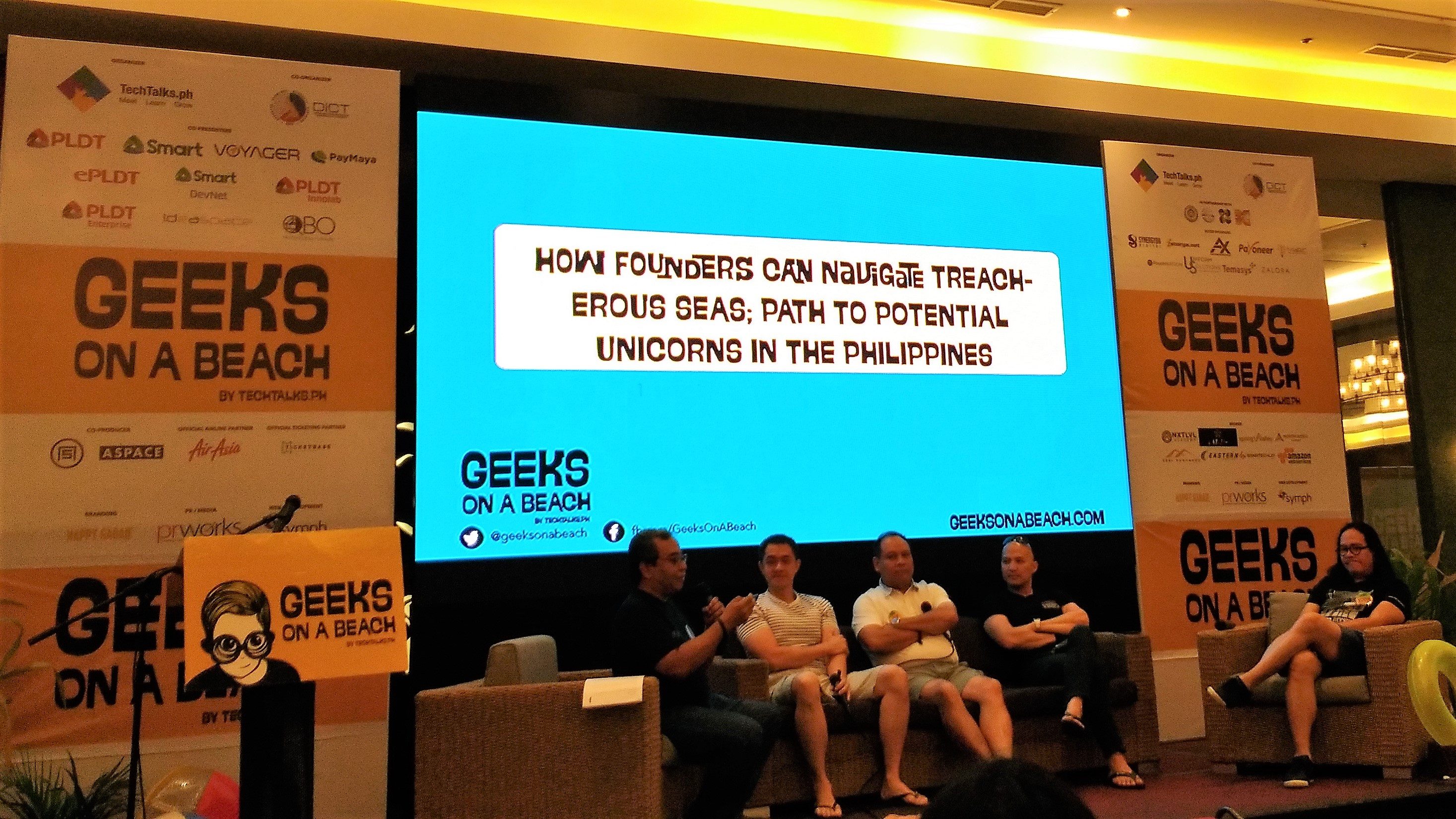SUMMARY
This is AI generated summarization, which may have errors. For context, always refer to the full article.

If you are planning on a startup business, then you may consider raising a unicorn, a cockroach, a rhinoceros, or a horse as your formula for success.
Yes, these are the suggestions from Filipino startup leaders, including Filipino-Americans who made it big time in a highly-competitive environment such as the Silicon Valley of the United States.
The big question thrown at them was whether Filipinos have the capability, the knowledge, and the acumen to raise a billion-dollar startup a.k.a. a unicorn.
They were gathered at the panel discussion “How founders can navigate treacherous seas: path to potential unicorns in the Philippines” at the 5th Geeks on a Beach (GOAB) held in August at the Princesa Garden Island Resort and Spa Hotel.
They agreed that raising a tech unicorn is possible; another panelist said why not aspire to be a cockroach, or a rhinoceros; still another, suggested a horse. No matter the animal, the panelists suggested that valuation, a fundable team (a team worth investing on), addressing the problems of a billion people are vital towards raising a successful startup.
Defining the unicorn
In its original sense, a unicorn is a legendary horse-like beast with a pointed, spiraling horn protruding out of its forehead. Its mythological origin is Asia and mentioned for the first time in the 5th century BC. Its abilities included turning poisoned water into being potable, healing sickness, among others.
Nowadays in the Fourth Industrial Revolution, the unicorn has metamorphosed into a metaphor for a highly successful digital “creature.”
In the age of digital, a unicorn, said Divestopedia, “refers to any technology startup company that reaches a $1 billion dollar market value as determined by private or public investment.” Aileen Lee, the founder of Cowboy Ventures, gave the unicorn its new meaning.
The unicorns of mythology are quite the rare creatures. Unicorns in startups are also rare, but are at least, real.
A report by Techcrunch in June 2017 showed more than 24 companies have joined the unicorn club in just 2017’s first five months. There were 50 new members of the club in 2016, with 2015 setting a record of 54 new entrants to the exclusive club.
For 2017, the United States with 13 new unicorns and China with 8 lead the pack. The startups based in the U.S. and China have been cornering the lion’s share of unicorns.
“Out of 231 companies on the unicorn board, 121 are headquartered in the U.S. and 66 are based in China,” Techcrunch said in an article written by Gene Teare.
Can Filipinos raise a tech unicorn?
That’s the question now – or, for that matter, a cockroach, or a rhino.
GOAB’s panel discussion at the resort gathered Filipino-American Antonio “Yobie” Benjamin, Aldo Carrascoso, and Jojo Flores of Silicon Valley, as well as Carlo Calimon, and Gian Paulo De La Rama.

Generally, the panelists agreed that a Filipino unicorn can be raised.
“I think it is possible. I think we can always aspire to be bigger. I think that we are slowly getting to that place wherein the next unicorn can be found,” Calimon, co-founder and chief marketing officer of MobKard, said.
Flores, co-founder and VP of Silicon Valley-based Plug And Play accelerator and incubator firm, had a quick “yes” answer.
“I think for any unicorn it is very important that you have a good team than can execute. Like any unicorn I think it is 80% of how you become a unicorn is that you have a really good, not just good, but an excellent team that will execute on company goals.”
“Of course, to upscale you need to have a big global concern, problem or pain point. And I think from the Philippines where, potentially, IT can be of significance is in the area of fintech (financial technology), in agriculture, aquaculture. Those two verticals have very big global concerns and pain points and problems, that need to be disrupted, addressed and solved.”
Another Silicon Valley-based Filipino-American success story, Carrascoso, co-founder and CEO of GlycoProx Biosciences (GPX), gave his views on how a startup turns into a unicorn.
He said “a unicorn focuses on valuation, rather than adding value. So, I think before we have a serious conversation about unicorns, focus on how fundable [a startup is] – [or do they] lack fundable teams? Filipino startups need to focus on creating actual value, product.”
Carrascoso added that a business model is important and the platform created is very scalable, creating tremendous value, leading to becoming a unicorn.
Benjamin, one of the tech gurus in Silicon Valley and CTO of clickSWITCH and CTO emeritus of Token.io, agreed on startups increasing their valuation.
“The notion of creating value, that should be the focus. It should not be ‘I want to be a billion-dollar company.’ It does not work anyway. Your focus should be value proposition, whether it is a service or product and an addressable market.”
Concerning the Philippines, Benjamin, Silicon Valley entrepreneur, angel investor and venture capitalist, wondered if startups can raise ($880) million dollars a year. He was referring to Dela Rama’s observation that a startup unicorn needs to be earning around $880 million annually.
Benjamin added that startups should be looking for a problem that is universally recognized and find solutions for it, problems that are the same with people in the Philippines, in India, and other countries.
While agreeing on the possibility of a Filipino unicorn, De La Rama, co-founder and CEO of InnoVantage, Inc., does not believe it can be raised in the next two or three years.
He batted for a change of mindset among entrepreneurs geared towards a fundable team and creating more value.
“To achieve ($880 million) revenue, would you charge $800 per customer? How many customers do you need to have that scale that you can shift your mindset? How do you build your company in such a way your customers will give you $880 million a year?”
Benjamin said the next step for startups is to solve the problem of a billion people. “That’s a better method. If it’s a problem that affects a billion people, that is a better metric to aim for. Go solve a problem for a billion people, rather than trying to be a billion-dollar company.”
Carrascoso ventured that instead of trying to raise a unicorn, he suggested that startups should channel the values of other animals instead. Be a cockroach or a rhino instead, he said.
In being a cockroach, he said, it “means you can survive any type of environment, adding that “startups should concentrate first on how to survive, which is very fundamental.”
“Unicorns are mythical, rhinos are real. Put it in the realm of being realistic.”
Or a horse, Calimon suggested, saying not everybody aspires to be a unicorn, anyway.
“There’s nothing wrong to being a group of horses. But in essence, I mean, I think we should aspire to become a unicorn. At the end of the day, it is all about getting value for our customers, getting value for the community, for the people that you want to serve. And I think creating value will lead to that.”
De La Rama said startup business not only in the Philippines needs to think about what skill sets are needed, and consider hiring people locally or from abroad towards attaining that “unicorn status.”
Meanwhile, Jonathan Defensor De Luzuriaga, president of Philippine Software Industry Association (PSIA) in his presentation for GOAB5 titled “Wanted: 1st Philippine Unicorn,” quoted GP Bullhound’s seven-steps winning formula that can help startups become a unicorn, which are:
1. Focus on consumers
2. Specialize in fintech, e-commerce or software
3. Don’t expect unicorn status overnight (European unicorns have an average age of nine years before reaching unicorn-hood)
4. Start in your 30s
5. Retain your funding team
6. Aim to raise over $100-million investment
7. Look for groups of investors
From his own perspective, Luzuriaga said other ways that can help achieve a billion-dollar valuation for startups is to create a startup ecosystem, embark on a talent creation/attraction initiative, establish innovation centers, attract funding resources, provide necessary support services, and add lots of real state. – Rappler.com
GOAB 2017 is the fifth GOAB since 2013. It’s organized by TechTalks.PH, the Department of Information and Communications Technology (DICT) and backed by business organizations, both domestic and international.
Add a comment
How does this make you feel?
There are no comments yet. Add your comment to start the conversation.